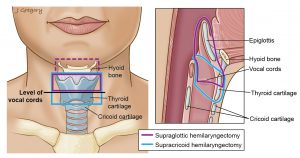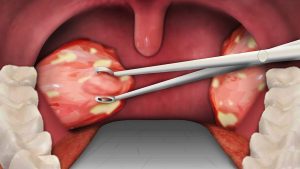Throat Treatment
Throat diseases can be caused by multiple conditions. Ask an ENT specialist In Nashik. to avoid complications or problems, associated with your Throat.
Following are the treatments and services offered at ENT Care Centre, for Throat diseases.:
- Treatment of vocal cord Cancer
- Head and Neck Cancer Surgery
- Tonsillectomy Procedures
- Micro Laryngeal Surgery
- Salivary Gland Surgery
- Laser Surgeries for head and neck Lesion
- Sleep Medicine
- Sleep Study
- Neck Tumor Surgery
- Treatment Of throat and Voice Problem
- Treatment Of vocal Cord Paralysis
- Treatment for Laryngotracheal Anomalies
- Treatment Of speech Disorder
- Speech Audiometry Procedure
- Tracheostomy
- Sore Throat
- Snoring in Children
Treatment of vocal cord Cancer

Most cancer experts agree, that vocal cord cancer likely starts, as small areas of abnormal cells. (dysplasia) that undergoes sequential changes, that ultimately lead to the development of cancer.
Pre-cancerous lesions may appear, as a white or red plaque. (called leukoplakia or erythroplakia) on the vocal cord and indicate, that a biopsy or removal of the lesion. needs to be done to rule out, the presence of cancer. Research indicates that removing, pre-cancerous lesions reduces the risk of developing cancer.
• Symptoms of vocal cord cancer, include a sore throat. the sensation of something stuck, in the throat. voice change, trouble breathing, trouble swallowing with associated weight loss. and the appearance of one or more lumps, that can be felt in the neck.
• The treatment recommendation will often, vary depending on the location and size of the tumor but often includes surgery and radiation therapy.
• Vocal cord cancer is very closely linked, with a history of smoking.
• If you have voice changes. that last for three weeks or longer. especially with a history of smoking. you should be evaluated to rule out, the presence of a lesion on your voice box.
• An estimated 10,000 cases of vocal cord cancer, are diagnosed each year, and close to 3,800 people die in the United States each year because of this disease.
Head and Neck Cancer Surgery

Head and neck cancers are cancers that start, in the tissues and organs of the head and neck. They include cancers of the larynx (voice box), throat, lips, mouth, nose, and salivary glands. Most types of head and neck cancer begin in squamous cells that line the moist surfaces inside the head and neck (for example, the mouth, nose, and throat).
Cancer of the head and neck are the most common cancers in India (30% of all cancers). Gone are the days when a stand-alone surgeon could treat a patient of head and neck cancer. Treatment of head and neck cancer now requires a multi-disciplinary approach with a team comprising of a head and neck cancer surgeon.
a reconstructive surgeon, an onco-anesthetist, a radiation oncologist, a medical oncologist, an onco-pathologist, a speech and swallowing therapist, a physiotherapist, a dental surgeon, an occupational therapist and a medical counselor.
In the past, the treatment of head and neck cancer was only aimed at cancer-free survival. Issues like cosmesis, speech, swallowing, pain relief, etc. were considered secondary. Over the last few years, the goals of such treatments have changed. Now, in addition to improved survival, we also aim to improve the quality of life of our patients with better cosmesis, better functional outcomes like normal speech, swallowing, taste, smell, etc.
Each member of the multi-disciplinary team works towards the goal of improving the quality of life of head and neck cancer patients. And, a good team can deliver excellent service with the support of advanced infrastructure.
Your surgeon aims to remove cancer and reduce any effects on your speech and swallowing. They will explain the operation to you and tell you if your appearance, speech, swallowing or eating may be affected. You may see a speech therapist and a dietitian.
Small cancers in the mouth may be removed through your mouth. The surgeon will need to make a cut in your skin to remove larger cancers at the back of the mouth or in your throat. If cancer is in the hypopharynx, the surgeon may need to remove some or all of the voice box (larynx).
If cancer is in the lymph nodes in the neck, a neck dissection may be carried out to remove some or all of the lymph nodes.
If some bone, such as the cheekbone or palate is removed, you may be given an artificial part (prosthesis). Some people have reconstructive surgery using tissue or bone from another part of the body.
Tonsillectomy Procedures

A tonsillectomy is a surgical procedure to remove the tonsils. Tonsils are two small glands located in the back of your throat. Tonsils house white blood cells to help you fight infection, but sometimes the tonsils themselves become infected.
Tonsillitis is an infection of the tonsils that can make your tonsils swell and give you a sore throat. Frequent episodes of tonsillitis might be a reason you need to have a tonsillectomy. Other symptoms of tonsillitis include fever, trouble swallowing, and swollen glands around your neck.
Your doctor may notice that your throat is red and your tonsils are covered in a whitish or yellow coating. Sometimes, the swelling can go away on its own. In other cases, antibiotics or a tonsillectomy might be necessary.
A tonsillectomy can also be a treatment for breathing problems, like heavy snoring and sleep apnea.
Micro Laryngeal Surgery

What is microscopic laryngeal surgery?
Microscopic laryngeal surgery, otherwise known as micro laryngoscopy, is the most precise means of visualizing and operating on the vocal folds. It allows the use of the two most essential tool sets in laryngeal surgery: the operative microscope, and micro laryngeal dissection instruments. All surgery is done through a laryngoscope, an instrument inserted via the mouth, without the need to make skin incisions.
What is microscopic laryngeal surgery used for?
Microlaryngoscopy is a surgical technique used in the evaluation and removal of various lesions of the vocal folds, including (but not limited to): cancer, cysts, papilloma, polyps, and Reinke’s edema.
Salivary Gland Surgery
Laser Surgeries for head and neck Lesion
Sleep Medicine
Sleep Study
Neck Tumor Surgery
Treatment Of throat and Voice Problem
Treatment Of vocal Cord Paralysis
Treatment for Laryngotracheal Anomalies
Treatment Of speech Disorder
Speech Audiometry Procedure
Tracheostomy
Sore Throat
What is Sore Throat?
A sore or dry throat is an unhealthy and painful scratchy feeling inside the throat which is coupled with the pain while swallowing and can cause really bad irritation. A sore throat usually resolves on its own because it is a mild health problem.
Causes of Sore Throat-
A sore throat is caused by many important risk factors. Let us have a look at some of them:
- Viral infection: It is the most common cause of a sore throat and several viruses are present which can result in a sore throat of many intensities.
- Toxins like cigarettes, smoke or pollution can also lead to an acute sore throat because of the unhealthy chemicals present in these things.
- A bad injury or infection in the throat can lead to a chronic sore throat. Sometimes when people should loudly for long periods also result in a sore throat because the tissues burn away of tear apart.
- Gastroesophageal reflux disease also causes a sore throat when the acid from the stomach retreats back to the esophageal tract.
- The development of cancer cells or tumor results in a sore throat and blocks the entire throat tract.
Treating a Sore Throat:
Sore throats are easily curable and sometimes they tend to go away on their own. Let us have a close look at the remedies:
- Gargling with warm salt-water will hell you to get rid of the sore throat because saltwater helps to wash away the viruses and germs.
- Honey mixed in tea is an excellent detoxifier and helps your body and throat to get rid of the unnecessary foreign objects stuck in the tract.
- Consuming fenugreek also helps in killing the bacterias which are causing the sore throat.
- Chamomile tea is a proven relief during throat sores. It has anti-inflammatory and antioxidant abilities that help the throat to get relief and heal over time.
- Drink warm water or liquids which will constantly keep the throat wet and warm leading to the decline of the bacterias present.
- Antibiotics can also be taken for 5-6 days if you think no other remedy is working in the right way. However, try not to give antibiotics to children of young age and stick to home remedies.
Snoring in Children
When there are vibrations in the top airways of the respiratory system because of obstruction to the air movement during the time of sleep, it leads to the sound of snoring. When a child gently squeaks or snores at night, it could be a warning sign of an underlying sleep disorder.
Common Reasons for Snoring in Children
• Infection in the Respiratory System– If the child suffers from a stuffy nose or from chronic allergies or cold then there is a chance that the snoring is brought on about by a blockage to the sinuses. The blockage to the nasal canal makes it difficult for the child to breathe normally and instead has to breathe through the mouth leading to the sound of snoring.
• Inflamed Tonsils– Enlarged adenoids, as well as tonsils, are the primary reasons for snoring in children. It is also a strong indicator of sleep apnea. The inflamed glands block the airways and the child finds it difficult to breathe during the night.
• Diverged Septum– When the airway of the nostrils is offset, it leads to the condition of a diverged or deviated septum. This again makes breathing through the nose quite a difficult job. This is because the passage is smaller as compared to others, lowering the quantity of airflow.
• Obstructive Sleep Apnea– Obstructive sleep apnea is a severe condition where the airflow becomes obstructed completely via the respiratory system. This makes breathing difficult through the nose and can lead to other associated health issues.
Symptoms of Various Snoring Problems in Children
Each of the disorders stated above is characterized by a number of symptoms that lead to the problem of snoring in children. These may include-
• The child continues to snore almost regularly
• The breathing is brought to a halt by snorts, gasps or pauses that extend longer than ten seconds
• The child suffers from restless sleep or tends to sleep in awkward positions especially with the head tipped backwards. Remedies After observing your child’s symptoms there are a few remedies you can try on the recommendation of your paediatrician.
• Give the child some medications for allergy or congestion
• You can put your child’s head up with the help of a pillow.
This can clear up the blocked nasal passage and bring the child some relief. Aside from these, your paediatrician might feel that you take your child and go see either an ENT specialist or a sleep specialist to figure out if the child suffers from obstructive sleep apnea.
